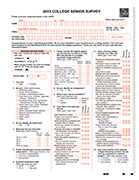2014-15 College Senior Survey Registration Is Open, and Paper is Back!
 Earlier this week we opened registration for the 2014-15 College Senior Survey (CSS), and we are thrilled to have re-introduced the option for a paper administration of the survey. Campuses that wish to learn more about their December graduates can register now and begin administering the survey on November 14. If you click the registration link, you will also notice the first phase of our new registration portal for the follow-up surveys. Campus representatives can use this portal to register for the survey, track survey responses, download preliminary data, and retrieve final reports.
Earlier this week we opened registration for the 2014-15 College Senior Survey (CSS), and we are thrilled to have re-introduced the option for a paper administration of the survey. Campuses that wish to learn more about their December graduates can register now and begin administering the survey on November 14. If you click the registration link, you will also notice the first phase of our new registration portal for the follow-up surveys. Campus representatives can use this portal to register for the survey, track survey responses, download preliminary data, and retrieve final reports.
I wanted to highlight a few important changes to the 2014-15 CSS. In our 2013-14 CSS Administration Report Form, we asked campus representatives about items they’d like to see on future CSS instruments, and we listened. For the first time in its history, the CIRP CSS includes items related to sexual orientation and gender identity – using the same items that have been on the Diverse Learning Environments (DLE) survey for the past several administrations. Additionally, we have provided a more granular approach to asking about students’ race/ethnicity; we now provide four categories for Asian students: East Asian (e.g., Chinese, Japanese, Korean, Taiwanese); Southeast Asian (e.g., Cambodian, Vietnamese, Hmong, Filipino); South Asian (e.g., Indian, Pakistani, Nepalese, Sri Lankan); and Other Asian. We also added a question asking respondents whether they identify as multiracial, similar to the DLE.
In looking at the past several years of data, we determined it was time to update the response options available in the financial aid question. The past few administrations showed that a substantial chunk of students used more than $10,000 (formerly the highest option) worth of loans or financial aid that did not need to be repaid (e.g., grants, scholarships) to cover educational expenses. The new response options provide campuses the opportunity to continue to trend the data (by combining different categories) while updating the total dollar amounts to reflect the following categories: None; $1-2,999; $3,000-5,999; $6,000-9,999; $10,000-$14,999; and $15,000+.
Another important change focused on the self-rated ability items – those pertaining to general knowledge, critical thinking skills, knowledge of a particular field or discipline, etc. Rather than ask students to rate their abilities in these areas (nationally we saw 85% of students rating themselves as strong/a major strength across the board), respondents will now assess whether they believe their undergraduate experience contributed to these abilities. Specifically, the question reads: “Please indicate your agreement with each of the following statements. This institution has contributed to my: Knowledge of a particular field or discipline; Interpersonal skills; Foreign language ability; Critical thinking skills, etc.” The response options are on an Agree Strongly to Disagree Strongly scale.
In a time where greater focus is being given to students’ experience with research during their undergraduate careers, we have added a question about the amount of time students spent doing research in college. The question reads: “How many months since entering college (including summer) did you work on a professor’s research project.” Response options range from 0 months to 25+ months. Ongoing research at HERI continues to point to the value of undergraduate research in facilitating students transition to graduate school – particularly among students in science, technology, engineering, and mathematics (STEM) majors.
We also learned that students found our new way of asking about future plans to be confusing, and we have streamlined this question. Rather than asking about primary and secondary activities, we ask students (yes/no) about their intentions to work full-time, work part-time, attend graduate school, volunteer, etc., in the fall following their completion of their undergraduate degree.
One last note that we hope everyone can appreciate: The survey is 10% shorter. We eliminated redundancies and took to heart feedback from campus representatives regarding items they found to be least helpful in their assessment efforts. We hope these changes make the CSS more inclusive, more useful, and more timely for our campuses. Registration is now open; administration begins November 14 and continues through June 26, 2015.
